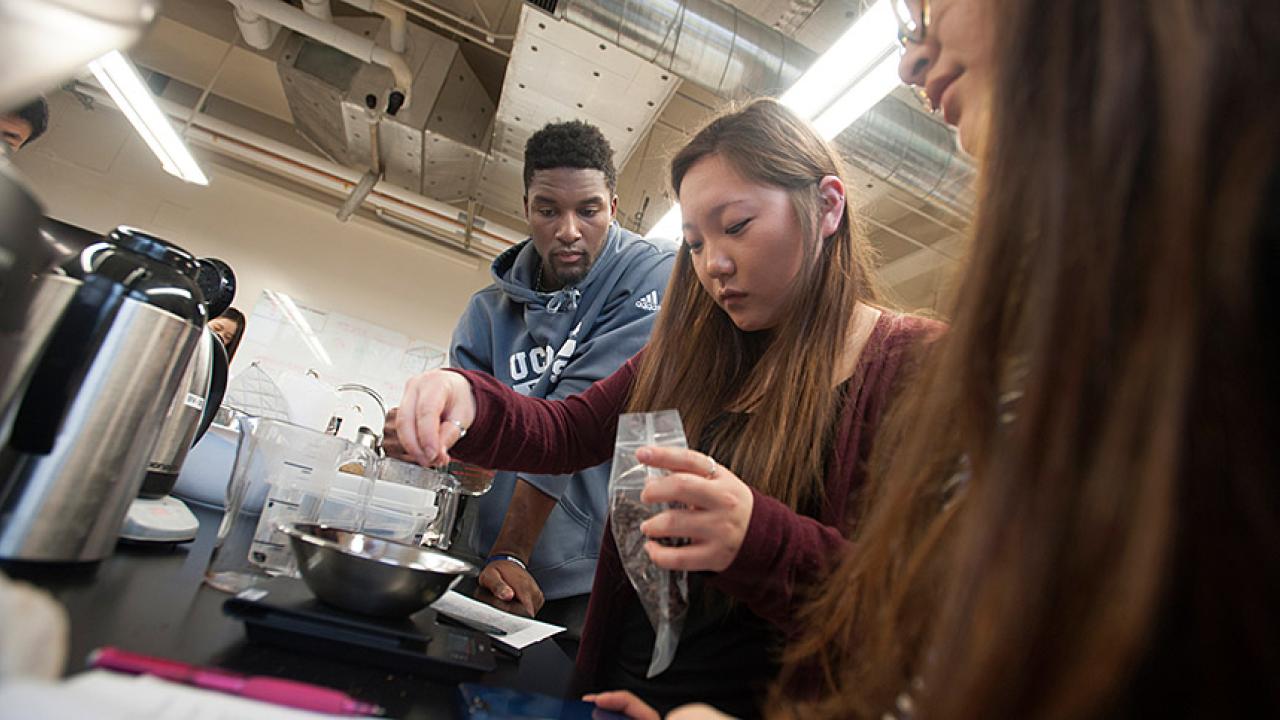From a latte with friends to an all-night study session, students likely drink as much coffee as anyone. But this winter, students at the University of California, Davis, are getting a new insight into their favorite hot drink through two new courses that use the roasting, processing and brewing of coffee to teach the principles of chemical engineering.
"From green bean to cup, the process of making coffee is all engineering," said Tonya Kuhl, professor of chemical engineering and materials science and of biomedical engineering, who is co-organizing the course with Professor Bill Ristenpart, Department of Chemical Engineering and Materials Science.
On a recent morning, the lab class air was rich with freshly roasted beans as students made careful measurements of the roasting and brewing process.
"All the operations that chemical engineers learn about are in the coffee process," said Ristenpart. "Fluidized beds, mass transfer, vapor/liquid equilibrium, thermodynamics."
Kuhl and Ristenpart hope the classes will engage students, teach them some basic principles of engineering, and give them a clearer idea of the problems engineers work on and the techniques that they use to solve them.
"A lot of people don't really know what engineers do. But brewing coffee is tangible to everyone," Kuhl said.
At the start of winter quarter, "Design of Coffee," a general education course open to all students, had a full enrollment of 300 students with more on the waiting list. A second course, aimed at undergraduates majoring in chemical engineering and materials science, had enrolled another 170 students. Both courses are heavily oriented around lab classes.
For an English major like Inez Kaminsky, "Design of Coffee" is a way to fulfill general education requirements in science.
"It teaches a way of thinking, rather than a profession," she said.
"I need the engineering and science credit, and I really like coffee," said Ilse Atkinson, a first-year student majoring in political science. "After two lectures, I feel like I'm getting a new appreciation of it. The entire process is much more complex than I realized."
The coffee courses grew out of hallway conversations about a need for more engineering lab classes earlier in the curriculum, Kuhl said. Typically, engineering majors get lectures on engineering topics, but up until senior year their practical classes are in subjects like physics and chemistry. More specialized engineering labs do not begin until senior year.
"The problem was, how to have a hands-on lab experience in engineering that does not take much time?" Ristenpart said.
Kuhl and Ristenpart started with a first-year seminar in spring quarter 2013. First-year seminars are small-group courses, specifically for freshman students, intended to introduce them to a wide range of topics. After the success of that course, Ristenpart and Kuhl went ahead with planning a full undergraduate program.
Students begin their lab studies by dismantling a coffeemaker to figure out how it works, then experiment with different techniques in roasting and brewing, measuring the chemical and physical changes involved. The course will end with a tasting competition: the object being to make the best-tasting cup of coffee from the same basic ingredients while using the least energy.
"We don't want it to be a, 'this is the way you do it' class," Kuhl said. "We want them to try different things, different methods and have an experimental design experience."
Setup for the course included renovating and refitting lab space, and was made possible by generous support from a number of donors, including Chevron Inc., Melita and Boyd's Coffee, as well as individual donors. These include John Wasson, a 1984 UC Davis alumnus and current president and chief operating officer of ICF International. Chevron and Wasson have made generous donations specifically to assist in the development of new kinds of engineering courses.
Kuhl holds the Jeff and Diane Child-Steve Whitaker Professorship in Chemical Engineering and Materials Science. Ristenpart holds the Joe and Essie Smith Endowed Chair of Chemical Engineering.
On the UC Davis home page: Students (from right, foreground) Sunveer Bajwa, Nadia Duenas and Westley Blacklock work in teams to discover knowledge for themselves. Watson Lu/UC Davis College of Engineering photo
Media Resources
Andy Fell, Research news (emphasis: biological and physical sciences, and engineering), 530-752-4533, ahfell@ucdavis.edu
Tonya Kuhl, Chemical Engineering and Materials Science, (530) 754-5911, tlkuhl@ucdavis.edu
William Ristenpart, Chemical Engineering and Materials Science, 530-752-8780, wdristenpart@ucdavis.edu
